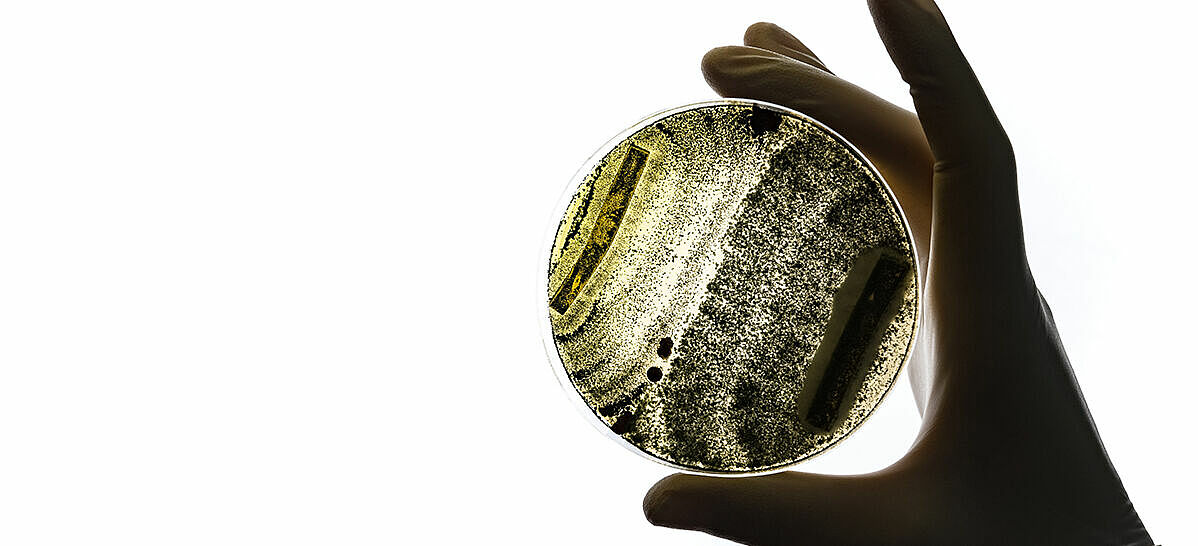In Bioresources unit at the AIT Center for Heath & Bioresources we work on the selection and the development of microbial biocontrol solutions with focus on bacterial and fungal diseases.
Plant diseases, pests and weeds are causing losses in agriculture and are leading to quality reduction in the food production. To maintain quantity and quality, agriculture still relies on the use of pesticides for the control of bacterial and fungal diseases, insect and nematode pests and weeds. The reduction of the use of hazardous chemical pesticides is one the major aims of the EU to improve the safety of consumers and agricultural workers and to protect the environment and biological diversity. Biocontrol with bacteria and fungi is one of the envisioned pillars to achieve these aims and to keep a stable agricultural production. Alternative solutions are urgently needed as also resistance to and reduction of the number of approved chemical pesticides is an issue. Biocontrol organisms can either directly influence the performance of pests by competition or production of inhibiting metabolites or are interacting with crop plants to increase pest resistance or tolerance against pathogens.
Microbial biocontrol in arable farming
In Bioresources unit at AIT we work on the selection and the development of microbial biocontrol solutions with focus on bacterial and fungal diseases. In one area we develop and build up collections of biocontrol strains protecting plants against damping off and root rots caused by Rhizoctonia, Pythium and Fusarium spp. Moreover, we work on solutions against fungal diseases responsible for infections in cereals such as Fusarium head blight and septoria leaf blotch caused by Zymoseptoria tritici and prominent and problematic fungal pathogens such as Sclerotinia and Verticillium. Our biocontrol strains consist of different taxa and include, among others, Arthrobacter, Bacillus, Paenibacillus, Pseudomonas, Trichoderma and various Bacteriodetes strains.
Biocontrol for viticulture and olives
A second focus lies on the biocontrol of grapevine diseases and diseases caused by bacterial pathogens. In this field, the particular challenge is the lack or limited number of current, even conventional solutions for a number of grapevine diseases such as ESCA and downy mildew and the emerging spread of pathogens such as phytoplasmas and Xylella fastidiosa. We address biocontrol and management solutions of grapevine diseases in current projects. Yet Xylella fastidiosa is not only a danger for future grapevine production in Europe but already causes devastating losses in olive production in Southern Europe which is addressed in the project “Biovexo”.
Development of specific application technologies
A key for improving performance of biocontrol strains are the application strategies. Here, we develop novel techniques and approaches such as inoculations of seeds (see Plant microbiome applications) by methods such as SeedJectionTM and EndoSeed, but also by development of foliar sprays, soil applications and formulation techniques. An important research aspect in our unit is studying and understanding of mechanisms as well as elucidating modes of action of biocontrol solutions.
We also offer research services where we perform microbiome and metagenomic analysis including bioinformatics. In addition, we provide detailed analysis of genomes and functions of individual bacterial and fungal strains including risk assessment and secondary metabolite prediction, but also monitoring of plant colonization by microscopical and molecular analysis with strain-specific markers developed by our unit. We also develop jointly with partners specific applications to develop biocontrol solutions.
FURTHER INFORMATION
For other microbiome-based applications, please see Plant Microbiome Applications
For further information on our formulation development, please see Formulations and Coatings
Selected Projects
| Biovexo | Biocontrol of Xylella and its vector in olive trees for integrated pest management | H2020; https://biovexo.eu/ |
| RATION Risk | Risk - Assessment Innovation for Low-Risk Pesticides | Horizon Europe https://www.ration-lrp.eu/project/ |
| SAGROPIA | Sustainable agriculture through novel pesticides using an integrated approach | Horizon Europe |
| Be-Xyl | Beyond Xylella, Integrated Management Strategies for Mitigating Xylella fastidiosa impact in Europe | Horizon Europe - https://bexylproject.org |
| HYPHOBIOME | Identifying the diversity of symbiotic endohyphal bacteria colonizing Fomitiporia mediterranea and the molecular strategies governing the associations as well as the underlying consequences | FWF (ESPRIT) |




